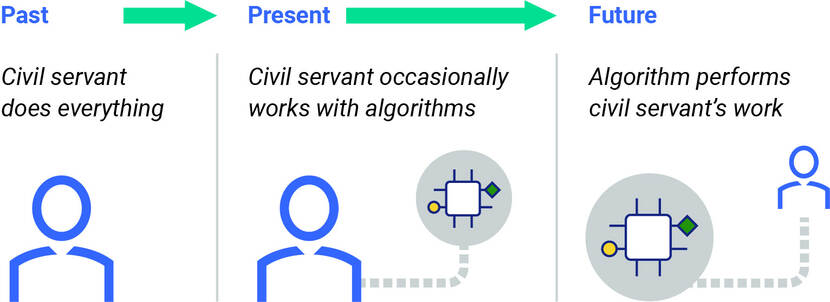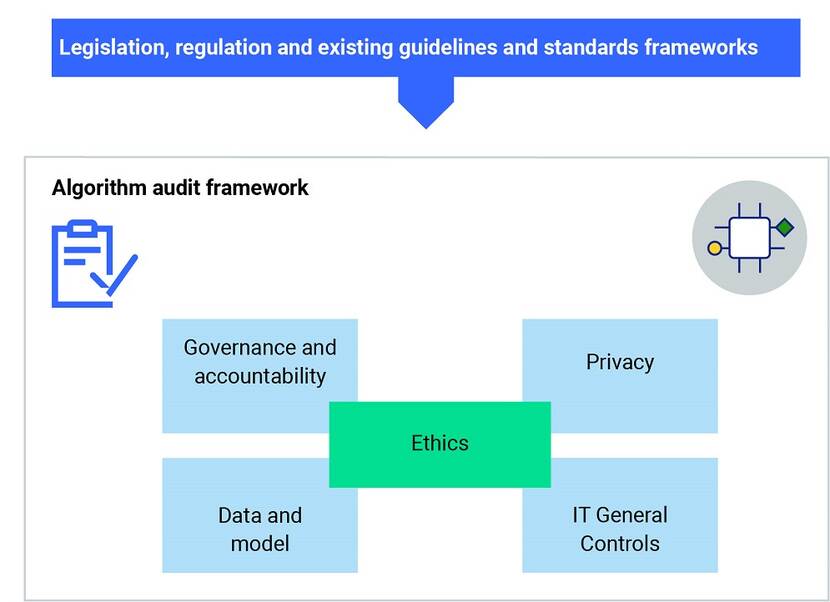Better quality control and more public understanding of government algorithms needed
Netherlands Court of Audit develops audit framework
The government, like private companies, is making increasing use of algorithms to automate its work, solve problems and make forecasts. The responsible development of more complex automated uses requires better scrutiny than ministers currently exercise and better quality control. The Court of Audit has developed an audit framework for this. The framework also considers ethical aspects of algorithms. The Court of Audit recommends that more account should be taken of questions from concerned citizens about the use of algorithms.
Civil servants are being assisted by algorithms more often

An algorithm is a set of rules and instructions that a computer follows to combine and analyse large volumes of data. The use of algorithms has consequences for citizens and businesses. Most of the algorithms currently in use are relatively simple and are used to perform operational management processes or provide services, such as the automated sending of letters and the initial selection of benefit applications. Some of the algorithms used by central government, however, are more innovative and use artificial intelligence. On request, ministries and implementing organisations such as the Employee Insurance Agency and the Social Insurance Bank provided many dozens of algorithms for our audit. The Court did not find any fully self-learning algorithms (ones that implement policy without human intervention).There are public concerns about the use of algorithms. The audit report, Understanding algorithms, published on 26 January 2021 sheds light on the opportunities, threats and myths of algorithms.
As part of the audit we developed an audit framework with input from experts inside and outside central government to assess the quality and responsible use of algorithms in practice. The Court of Audit invites the government to use this audit framework as a platform for the development of new algorithms.
The framework assesses an algorithm on the following aspects: governance and accountability, model and data, privacy, quality of IT General Controls (ITGC, such as access and back-up controls), and ethics. The ethical aspect is concerned with the human dimension of algorithms. The purpose of the assessment is to detect potential weaknesses in the use of algorithms. The audit framework is presented in the report and is available digitally at https://www.rekenkamer.nl/algoritmes-toetsingskader.
Insufficient account taken of private citizens
The Court of Audit found that government interests were central to algorithms, not private citizens’ interests. The government recognises the importance of privacy but takes little account of ethical aspects. Ethical aspects mean algorithms must not discriminate, must take account of population diversity and must be auditable by humans. Citizens must be able to understand the use and operation of algorithms. They must also know where they can ask questions and lodge objections. Serious attention must be paid to public concerns and doubts about algorithms.
Algorithms are not without risk. Incorrect or biased use of a database can have a discriminatory impact. A judge ruled last year, for instance, that the SyRi system used by central government for the administration of benefit payments was discriminatory and the government accordingly stopped using it.
The government’s use of algorithms can become dependent on external suppliers (proprietary rights, personal data processing). The government must ensure that data security is adequate to prevent sabotage, espionage and criminality and that the algorithms are managed and maintained correctly.
The algorithms we audited could be analysed: they were not black boxes. The importance of quality control increases as algorithms become self-learning (with less input from civil servants).
Response of the state secretary to our recommendations
The State Secretary for the Interior and Kingdom Relations responded to the recommendations and points for improvements in our audit report in his capacity as the person responsible for coordinating IT management. In its afterword, the Court stated that officials in virtually all ministries had a considerable need for greater uniformity in the terminology, quality guidelines and quality standards used. The audit findings and audit framework could play an important role in this.
The audit framework consists of 5 perspectives

The Court of Audit considers the use of algorithms to be a fixed aspect of its audits of central government operational management and performance. It will apply and refine the audit framework in these audits. A digital congress will be held on this theme for government and business officials on 28 January 2021.